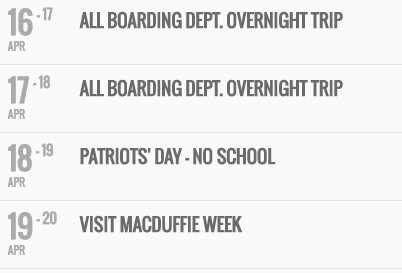Long weekend for what now?
For MacDuffie, Patriots’ Day is a blessing of geography that merits a day off rather than in-school commemoration.

The section of the school calendar that confirms that yes, this is a thing, from macduffie.org.
April 16, 2016
Most of us have probably been made aware at this point that we have the luxury of our first three-day weekend of the spring upon us. But it wouldn’t be surprising for anyone to wonder why, exactly, we aren’t in class on Monday.
Patriots’ Day may seem obscure, and the day off out of the blue, because it’s not even a national, never mind international, holiday; our observance of it is conditional on our location in the Commonwealth of Massachusetts. Maine, having once been part of that Commonwealth, tags along. The other 48 US states go to work.
This special treatment exists because Massachusetts is home to Lexington and Concord, where the first battles of the American revolution were fought on April 19, 1775. “Battles” is a bit of an embellishment; the small town skirmishes were nothing like the war’s major battles in Boston, New York, and Yorktown, Virginia. But Lexington and Concord are surrounded with symbolism (Paul Revere’s Ride and The Shot Heard Round The World are local staples of mythologized history) and Massachusetts loves to remind everyone that we did Revolution before anybody else. So we pretend every third Monday of April is the 19th (because holidays without long weekends defeat the point) and let everyone stay home.
A quick note on semantics: “Patriot” is capitalized here because it refers specifically to the instigators of the American revolution, who from Britain’s point of view were engaging in the opposite of “patriotic” occupation.
That was all a really long time ago, of course, and now the day primarily serves to absolve everyone in the greater Boston area of their normal itinerary for its arguably more recognizable manifestation, Marathon Monday, when lots of people run 26 miles through relatively obscure suburbs to eventually get to the iconic Copley Square finish line. Unfortunately, that tradition has acquired a veneer of solemn observance since the 2013 Boston Marathon bombings, but it continues to be one of the more culturally prominent one-off sporting events in the country.
And none of that has all that much to do with us, with a large international population and a day student pool concentrated in Western and Central Massachusetts. Despite this, or perhaps because of it, we still get the day off. An explanation of the significance of the American Revolution probably happened in US history classes sometime in October, so it won’t be happening in a special assembly, for better or worse. Our idiosyncratic approach to holidays can be unpredictable, but for now it’s getting us an extra day of rest.